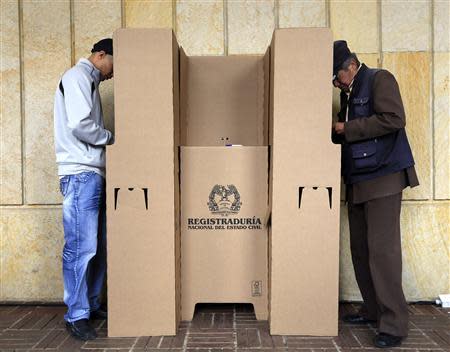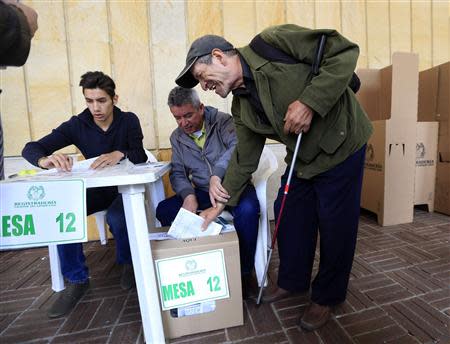Colombia's Zuluaga pushes Santos to presidential runoff vote
By Brian Ellsworth and Helen Murphy BOGOTA (Reuters) - Opposition candidate Oscar Ivan Zuluaga won most votes in Colombia's presidential election on Sunday but fell short of a first-round victory and will face President Juan Manuel Santos in a runoff that casts doubts over peace talks with Marxist rebels. Zuluaga had 29.3 percent support and Santos trailed on 25.6 percent with returns in from almost 99 percent of voting tables. They had needed more then 50 percent for victory so will now go to a runoff on June 15. The election was largely seen as a plebiscite on Santos' strategy of negotiating a peace deal with Marxist guerrillas to end a 50-year-old war that has killed some 200,000 people. Zuluaga, a right-wing former finance minister, accuses Santos of pandering to terrorists and has suggested he would scrap the peace talks in favor of U.S.-backed military campaigns similar to those led by his mentor, former President Alvaro Uribe. "Security is important to us; we are 100 percent with Zuluaga," said Jose Gomez, 39, as he left a Bogota polling station with his wife and daughter. Santos, 62, fell out with Uribe after launching peace talks with the Revolutionary Armed Forces of Colombia (FARC) instead of sticking to Uribe's strategy of forcing the group's surrender on the battlefield. Santos appeals to Colombians who hope the guerrillas will negotiate peace and lay down their weapons after seeing top leaders killed and their numbers halved to about 8,000 fighters over the last 12 years. The talks in Cuba have yielded agreements on three items of a five-point agenda, including one deal just signed in which the FARC agreed to step away from the drug trade and another which would allow the FARC to take part in politics. Zuluaga, 55, has galvanized conservative Colombians who believe the talks will fail like three similar attempts since the 1980s, including one that allowed the FARC to bolster its ranks and extend its involvement in the cocaine trade. Although the results on Sunday were a blow to Santos, he could receive the backing of two other candidates, Enrique Penalosa and Clara Lopez, who both support negotiations with the FARC and together garnered close to 24 percent Of the vote. The fifth candidate, Martha Lucia Ramirez, is skeptical of the talks and her supporters may swing behind Zuluaga. She had about 15 percent support on Sunday. Santos launched the peace talks in 2012 and said they will likely collapse if he does not win a second term but Zuluaga - and Uribe behind him - says the government is negotiating from a position of weakness. If he wins the runoff, Zuluaga says he will give the FARC eight days to lay down their weapons and will halt the peace talks if they refuse. That appeals to many Colombians outraged at the possibility that rebel leaders could eventually hold seats in Congress and potentially avoid prison sentences for crimes committed during the war. Zuluaga's critics, including Santos, dismiss him as a puppet of Uribe who would effectively allow the hardline former president to rule from behind the scenes. Others note Santos faced similar criticisms before his break with Uribe. The election campaign was rocked by a series of scandals, including accusations that Zuluaga's team sought to sabotage the peace talks by hacking negotiators' email accounts and allegations that Santos took drug money during his 2010 campaign. Both men deny any wrongdoing. (Additional reporting by Peter Murphy and Julia Symmes Cobb; Editing by Kieran Murray)


